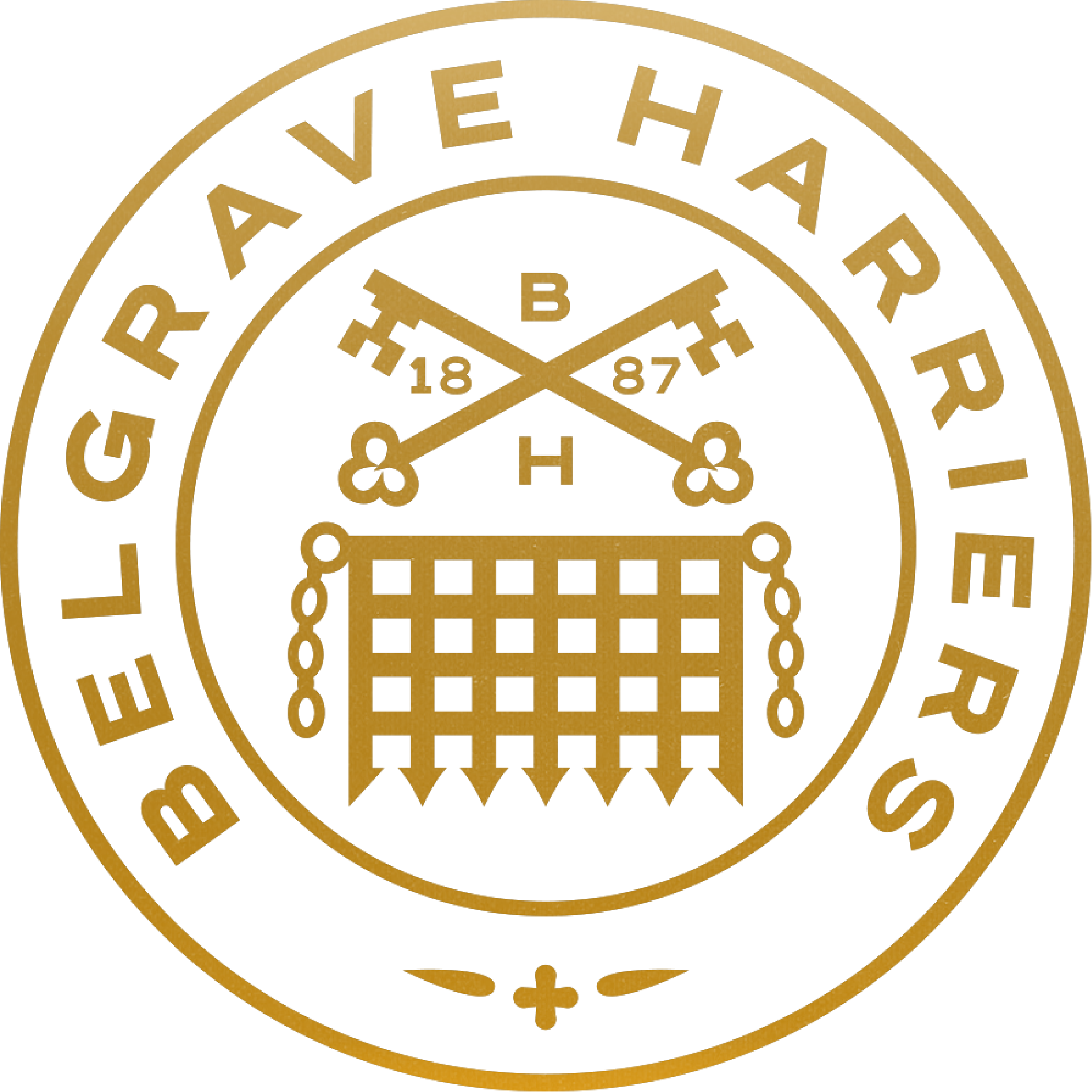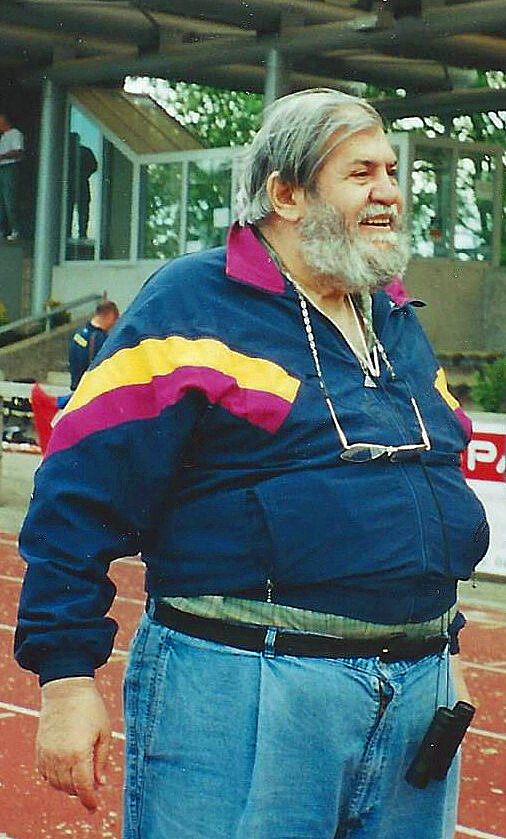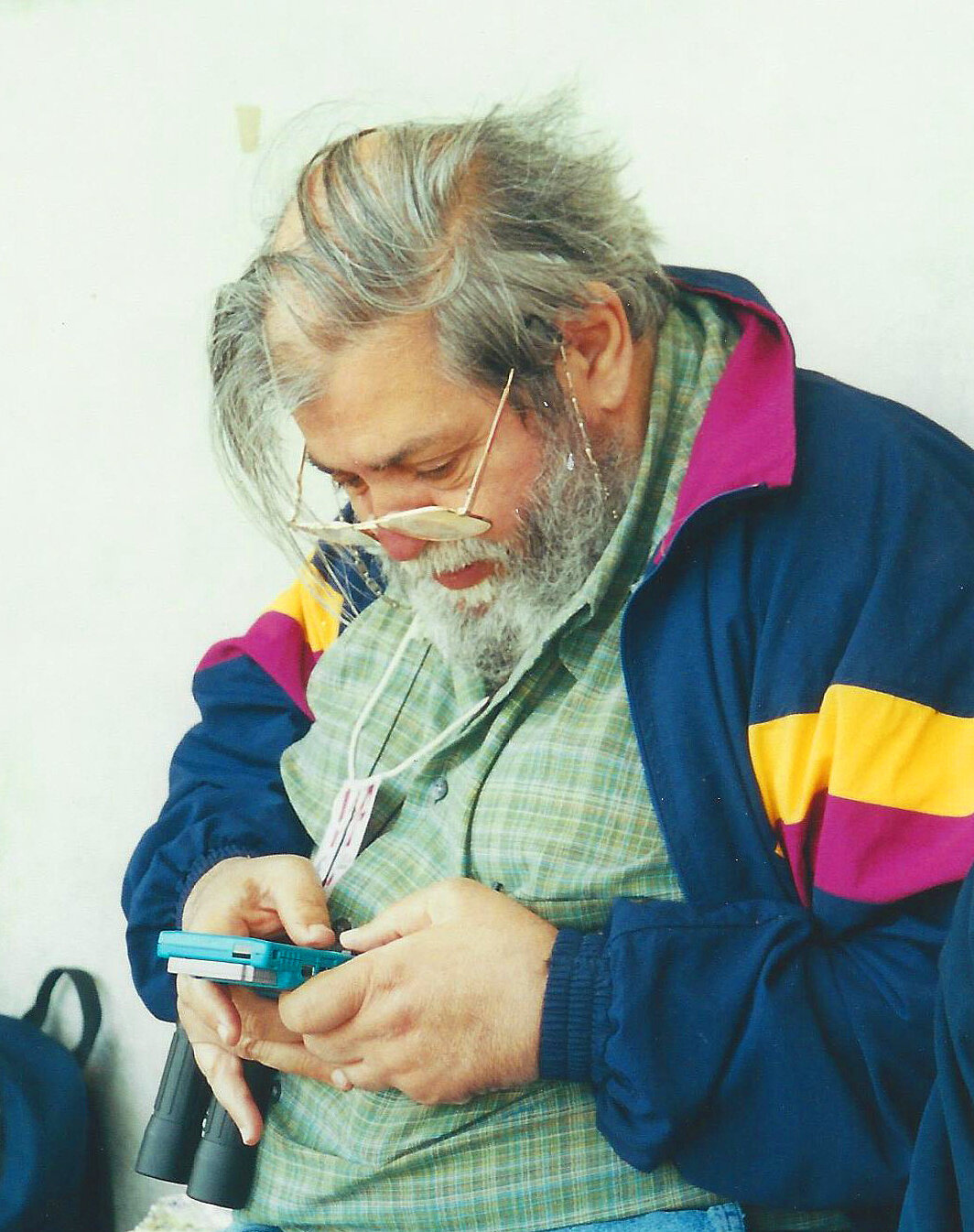Obituary: Sir Eddie Kulukundis, 1932-2021
By club historian Alan Mead, author of the fascinating archives at belgraveharriers.info
Sir Eddie, Belgrave’s most ardent fan, in club shellsuit and armed with binoculars
We regret to record the passing, on 17 February 2021, of Sir Eddie Kulukundis, O.B.E. He was 88 years old and was married to Susan, Lady Kulukundis, C.B.E., the notable actress known professionally by her maiden name Susan Hampshire, and to whom we offer our sincerest condolences. Eddie married Susan in 1981, and since 2009 she had cared for him while he suffered from the encroaching twin scourges of type 2 diabetes and dementia.
So well known throughout the worlds of business, theatre, and sport, many tributes will be paid to Sir Eddie, but for Belgrave Harriers, he will go down in the club’s history as the benefactor who helped our track and field team, already on the rise, achieve extraordinary success. He was Patron of Belgrave Harriers for a quarter of a century from 1986, a period during which Belgrave became one of the strongest outfits in Europe, only outperformed by a handful of state or military squads, or those with the unlimited backing of global companies.
Elias George Kulukundis was born in London on 20 April 1932, the son of a Greek shipping family who had made their home in the city. But at the age of eight, his family moved to New York and Eddie’s schooldays were spent at Salisbury School, Connecticut, from which he graduated in 1950. He was ever an avid sports fan. By no means a natural athlete, he took on a role as a statistician, the anorak who kept score. His first love was baseball but on his return to London he encountered athletics and when he much later struck up a relationship with Belgrave Harriers, he could state that he had attended every track & field session of every Olympic Games since 1960; he continued to do so for very many years and had the knack of being able to recall virtually any performance from any championship or major Games.
Sir Eddie once said, “My luck is that my parents were very wealthy.” His family were from the Aegean island of Kasos and have been in shipping for well over 150 years, eventually setting up the Rethymnis & Kulukundis shipbroking business in London in 1920, not to mention maintaining interests in various other shipping enterprises. But wealth is no protection from tragedy, and many vessels were torpedoed during the war and in later years his nephew Minas Kulukundis was killed in the Lockerbie air disaster.
Being well-off does enable a person to indulge in their passions, however. While domiciled in the United States an interest in the theatre led Eddie to start producing plays and he co-produced the 1976 award-winning play Travesties by Tom Stoppard. Knightsbridge Productions was formed with actor and director Jack Lynn and in 1993 Sir Eddie was part of a consortium aiming to help the Duke of York's Theatre on St Martin's Lane survive. The consortium became the Ambassador Theatre Group.
A meeting with 1968 Olympic gold-medallist David Hemery converted Eddie’s enthusiasm for athletics into practical involvement. It was at the 1972 Munich Olympics and having only won the bronze medal David felt that he’d let everyone down. Eddie was so impressed by Hemery’s self-effacement that it kindled the older man’s interest in helping. Two years later they met again, in New Zealand, at the Christchurch Commonwealth Games, and from thereon Eddie was determined to help up and coming talented youngsters to achieve their aims by giving financial assistance. So many top-class athletes, household names, owe their success to the help given by Sir Eddie.
Sir Eddie became a Vice-President, trustee, and governor of the Sports Aid Foundation. His generosity extended to assisting the modern pentathlon team, and the yachting team. He organised multi-event athletic meetings to ensure Britain’s athletes got the best competition available in an attempt at Olympic qualification; he was chairman of the London Coaching Foundation, the Midland Coaching Foundation, and Athletes Youth Performance; Vice-President of UK Athletics, chairman of the British Athletic Field Event Charitable Trust; the list became endless.
When the “bible of athletics” Athletics Weekly was purchased in 1987 by Emap and was dumbed down to target an audience far less discerning than the readership of the previous 42 years, Eddie funded the relaunch of Athletics Today, a formidable rival for the next five years.
Sir Eddie and Belgrave
As for Belgrave, it was the idea of our Treasurer of the day, Ron Severn, to seek out a Patron; someone to act as a Club Benefactor, as had been a regular occurrence in many clubs in the late 19th century and even up to the Second World War. Some very distinguished names had assisted Belgrave Harriers in their earliest days. Ron contacted Sir Eddie to see if he would be interested in taking on such a role as the Club thought about entering its second century.
There was no response, so Ron wrote again, and in Eddie’s own words, while reflecting with a colleague in later years:
“I’d received a letter from Ron Severn asking if I’d be Patron of Belgrave Harriers and I hadn’t got around to answering it. He then wrote me another letter mentioning that he hadn’t received a reply and that he’d like to call to see me. Having not answered the first letter I thought it would be rude to turn him down and he arranged to call at my home at 7 pm. I didn’t get there until 7:30 pm – and there wasn’t just Ron – there was a whole group of them. I agreed.”
Sir Eddie takes a Gameboy break between events on the track.
The “whole group” laid out their plans and ambitions, and Eddie didn’t respond immediately, he thought long and hard before replying in the affirmative. He made it quite clear that he was interested in track and field and individuals, and he wasn’t interested in supporting teams in inter-club competition.
Inevitably, when announced, this patronage caused some consternation among other clubs. “Why Belgrave? They’re not even in the top-flight of league athletics.” Undoubtedly his support of individual athletes benefitted the club tremendously, for it takes individuals to make up a team. The Belgrave team went from strength to strength and before long he had become the track and field team’s most ardent supporter. There are far too many examples of his generosity to list here, and it is not the time or place anyway. But an example would be the backing of what would have previously been thought of as an outrageous plan – to fly an athlete back from Texas for the weekend so that he could take part in the British League.
But such activities also triggered envy and controversy. Even when the club’s Road Running & Cross-Country teams slowly began to make their mark, in the new millennium, not directly benefitting from Sir Eddie’s support in any way, letters were written to Athletics Weekly, complaining of “cheque-book athletics”. Response to AW from a member of our distance team in the vein, “I’ve never even seen Sir Eddie’s cheque-book,” cut no ice. Tall poppies are always the first to feel the gardener’s scythe.
George Harrison once sang All Things Must Pass. And so, they surely must. Over a cycle of 25 years, members on the ground within our Club aged and slowly lost the fire of earlier days, and throughout sport in general, Sir Eddie gradually reined in his generosity when athletes he had supported did not always act in a way he found to be acceptable. But what an amazing period; and what an impact was made by Sir Eddie Kulukundis.
ARM February 2021


